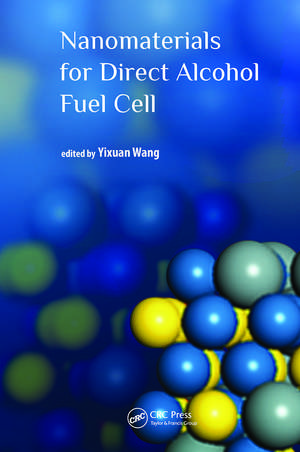Nanomaterials for Direct Alcohol Fuel Cell
Editat de Yixuan Wangen Limba Engleză Hardback – 23 noi 2016
Illustrated throughout with excellent figures, this multidisciplinary work is not just a reference for researchers in chemistry and materials science, but a handy textbook for advanced undergraduate- and graduate-level students in nanoscience- and nanotechnology-related courses, especially those with an interest in developing novel materials for advanced power systems.
Preț: 565.76 lei
Preț vechi: 757.24 lei
-25% Nou
Puncte Express: 849
Preț estimativ în valută:
108.26€ • 117.96$ • 91.22£
108.26€ • 117.96$ • 91.22£
Comandă specială
Livrare economică 02-16 aprilie
Doresc să fiu notificat când acest titlu va fi disponibil:
Se trimite...
Preluare comenzi: 021 569.72.76
Specificații
ISBN-13: 9789814669009
ISBN-10: 9814669008
Pagini: 298
Dimensiuni: 152 x 229 x 22 mm
Greutate: 0.56 kg
Ediția:1
Editura: Jenny Stanford Publishing
Colecția Jenny Stanford Publishing
ISBN-10: 9814669008
Pagini: 298
Dimensiuni: 152 x 229 x 22 mm
Greutate: 0.56 kg
Ediția:1
Editura: Jenny Stanford Publishing
Colecția Jenny Stanford Publishing
Public țintă
Academic and PostgraduateCuprins
Advanced Anode Catalysts for Direct Alcohol Fuel Cells Multimetallic Nanocatalysts for Anodic Reaction in Direct Alcohol Fuel Cell. Understanding Electrocatalytic Activity Enhancement of Bimetallic Nanoparticles to Ethanol Electro-oxidation Reaction. Theoretical Aspects of Gold Nanoparticles for Ethanol and Glucose Oxidation. Proton Transport and Design of Proton Electrolyte Membranes for Direct Alcohol Fuel Cells. Nanomaterials for Oxygen Reduction Reaction (ORR). Advances in Understanding the Effects on the Ethanol Electro-oxidation Reaction.
Notă biografică
Yixuan Wang is a full professor in the College of Science and Technology at Albany State University (Albany, USA). He earned his PhD in theoretical chemistry from Shandong University in 1994 and completed postdoctoral training at the Max Planck Institute for the Physics of Complex Systems (Dresden, Germany), Ludwig-Maximilians University (Munich, Germany), and Texas A&M University (College Station, USA). Prof. Wang has published about 80 peer-reviewed journal articles, coedited one book, and contributed six book chapters. His expertise is in computational/theoretical chemistry with applications in molecular design of nanomaterial-based drug delivery systems, noncovalent interactions of bio-nano systems, and molecular modeling and simulations of advanced power sources. His research as a principal investigator is currently supported by the National Science Foundation, the National Institutes of Health, the American Recovery Reinvestment Act, and the ACS Petroleum Research Fund. Prof. Wang has twice won the Research of the Year Award from Albany State University (2009, 2014) and the 1997 State Natural Science Award from the State Council of China.
Descriere
This book focuses on the most recent advances in the science and technology of nanostructured materials for direct alcohol fuel cells, including novel non-noble or low noble metal catalysts deposited on the graphene layer and metal-free doped carbon black for oxygen electro-reduction reaction, Sn-based bimetallic and trimetallic nanoparticles for alcohol electro-oxidation reaction, and novel nanomaterials for promoting proton transfer in electrolyte. In addition, the book includes chapters from not only experimentalists but also computational chemists who have worked in the development of advanced power systems for decades.
